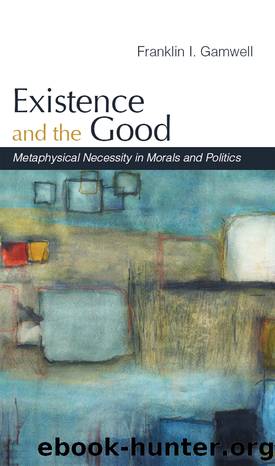Existence and the Good by Gamwell Franklin I.;

Author:Gamwell, Franklin I.; [Gamwell]
Language: eng
Format: epub
ISBN: 3407090
Publisher: State University of New York Press
Published: 2011-05-17T00:00:00+00:00
Self-understanding also means that subjective activities necessarily affirm some understanding of the good, in terms of which alternative ends are discriminated as better and worse. This follows because a self-understanding is consciousness of one's purpose as chosen. To be sure, such awareness requires a descriptive discrimination of possible ends and, thereby, a comparison of them in terms of descriptive similarities and differences by which they are characterized. Indeed, as alternatives for conscious choice, ends are future possible states of affairs in the respects that or insofar as they are understood. For instance, one decides to vote for and, thereby, pursues the election of one of two or more senatorial candidates, described, say, in terms of their own political commitments. But one cannot understand the choice, pursuit of t instead of t1 or t2 or ⦠tn, unless the ends are compared with respect to choosing, and a comparison of possible purposes in this respect is an evaluation. To understand some future possibility as a chosen telos is to affirm it as good and thus to compare it with alternatives in terms of better and worse.
At least implicitly, then, every activity understands itself in terms of some principle of purpose, that is, a principle of good purposes in view of which alternative ends are compared with respect to choosing. In this sense, we may say, with Kant, that rational beings understand their exercise of freedom in terms of a maxim for action. Also with Kant, the principle of evaluation is itself chosen, at least if differing choices among the alternatives exemplify differing evaluative comparisons, because the decision by which a subjective activity is constituted is a decision about the good and thus for the terms of evaluation. Such principles may be of greater or lesser specificity. One may decide that voting for a certain candidate is good because one decides that the candidate's commitment to civil rights is good, and one may decide that the candidate's commitment to civil rights is good because one decides that a democratic society is good. Against Kant, however, principles of evaluation must always be or imply principles of purpose, by which I mean those that compare possible ends or tele' in their entirety, as marked by all of their descriptive similarities and differences. Decision for some possible future cannot choose it solely in some aspect because the choice can only be among alternative ends as whole things.
For this reason, no feature in terms of which ends are compared only in part can be adequate for evaluation. This is, so far as I can see, the mistake in all nonteleological ethics, of which Kant's conception of the moral law is the preeminent example. Here, nonteleological ethics are those on which the supreme principle of evaluation defines a partial comparison of alternatives for purpose. On Kant's moral theory, for instance, good action respects the freedom of all other persons, that is, treats them as ends withal, never merely as means, where this categorical imperative defines a partial
Download
This site does not store any files on its server. We only index and link to content provided by other sites. Please contact the content providers to delete copyright contents if any and email us, we'll remove relevant links or contents immediately.
Getting It, Then Getting Along by L. Reynolds Andiric(655)
Religion and Politics Beyond the Culture Wars : New Directions in a Divided America by Darren Dochuk(575)
Global Justice, Christology and Christian Ethics by Lisa Sowle Cahill(429)
Positive Psychology in Christian Perspective: Foundations, Concepts, and Applications by Charles Hackney(355)
Forgiveness and Christian Ethics by Unknown(350)
Douglas Hamp The First Six Days by Unknown(297)
The Horrors and Absurdities of Religion by Arthur Schopenhauer(271)
Insurgency, Counter-insurgency and Policing in Centre-West Mexico, 1926-1929 by Mark Lawrence(267)
Middle Eastern Minorities: The Impact of the Arab Spring by Ibrahim Zabad(250)
Christian Martyrdom and Christian Violence by Matthew D. Lundberg;(244)
Beyond Heaven and Earth by Gabriel Levy(237)
The Oxford Handbook of Greek and Roman Mythography by R. Scott Smith;Stephen M. Trzaskoma;(235)
God and Eros by Patterson Colin;Sweeney Conor;(231)
The Bloomsbury Reader in Christian-Muslim Relations, 600-1500 by David Thomas;(225)
Autobiography, Volume 2: 1937-1960, Exile's Odyssey by Mircea Eliade(216)
Cult Trip by Anke Richter(212)
Witches: the history of a persecution by Nigel Cawthorne(211)
An Introduction to Kierkegaard by Peter Vardy(202)
The Global Repositioning of Japanese Religions by Ugo Dessi(196)
